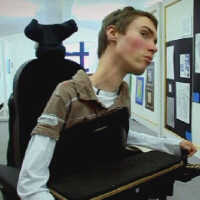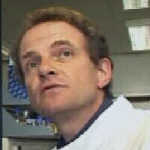Stuart Wickison
The Boy Who Can Never Grow Old
Duchenne Muscular Dystrophy

Stuart Wickison
Imagine if you were born able-bodied but, without any warning, all the muscles in your body gradually started to shut down.
Stuart Wickison has a rare genetic disorder; Duchenne Muscular Dystrophy. The average life-expectancy with this condition is in the early twenties, Stuart is nineteen. But, its now he's embarking on one of the most important journeys of his life. Over the next two months, Stuart's world is going to change forever. Although his body is failing him, his mind is focused on living. He tells us: "People always argue about the meaning of life. You are born to die. But, what about the bit in between, what about the living? Well, I'm here for that, I'm not going to suffer, I'm here to make an impact".
Stuart is studying for his A-Levels. He hopes to become an artist and attend university, but he needs to pass his exams to gain entry to university.
Duchenne Muscular Dystrophy or DMD is a genetic condition that only affects boys. They're born able-bodied and only find out the full prognosis in their teens. DMD is caused by mutations of the gene which produces dystrophin, a protein essential for the healthy development of muscles in the body. Without it all muscles gradually cease to function causing gradual paralysis.
Having noticed that Stuart wasn't walking like other toddlers, his parents decided to have him examined. The results were devastating. Mandy, Stuart's mother recalls "At the age of three they were telling us that his condition was such that he would lose all muscles and it would be fatal in the teenage years".
Stuart's condition became so severe in his teens that he had to leave his home for 24 hour residential care. Nick Hart a consultant in respiratory medicine explains "Duchenne is a relentless, progressive disease that will be the cause of the patient's death. Its got huge physical problems associated with it which will affect the breathing muscles, the heart muscles and the swallowing muscles. It will affect nutrition, it will increase the chance of getting chest infections because they don't have adequate breathing muscle and the ability to cough and clear secretions".
Stuart ha reached an advanced stage of the disease. His ability to swallow is rapidly deteriorating. For the past three years, Stuart has attended Treloar College in Hampshire which provides specialist health care for severely disabled teenagers. The 180 students who live and study here receive far more than just an education. At Treloar they're encouraged to live like other teenagers with care and support from the staff.
Aged nineteen, Stuart's not expected to live long into his twenties. But, its now he's decided to take the biggest step in his life. To leave the sanctuary of Treloar to study art at university. He tells us "Everyone has dreams and ambitions whether you're disabled or not, and I don't want to be the one that suffers his whole life and wastes it". Leaving Treloar, he's not just leaving the care and support, he'll also be leaving some very close friends.

Prof. Dominic Wells
Scientists are close to finding a cure, giving Stuart and his friends hope, but more funding is urgently needed. Stuart is angered at the amount of money spent on people, he perceives as having made themselves ill, by smoking and over-eating when people like him with a genetic condition can't get treatment.
Funding for research is critical as scientists now have good reason to believe a cure is in sight. At the forefront of the research is Professor Dominic Wells. Professor Wells is pioneering the latest research into treatment that transfers healthy genes into damaged muscles. He relates "The problem with Duchenne is that you've got a dysfunctional version of the dystrophin gene. Gene transfer therapy aims to put back a functional version of the dystrophin gene".
Using viruses, Professor Wells has transferred a man-made version of the gene into animal muscle, reversing the effects of Duchenne. He continues "By harnessing the ability of viruses, that have evolved over millions of years specifically for getting genetic material into cells, we're able to take that carefully evolved function and use it to make our very efficient gene transfer". Developing a treatment is a long and complicated process which is very unlikely to happen in Stuart's lifetime.

Mandy, Stuart's Mother
Treloar students are encouraged to have a full social life, and Friday night sees them hitting the night spots in Woking. With the drink flowing they explain that, despite their disability, they still have desires and they would all love to lose their virginity.
Stuart has to wear a mask connected to a night ventilation machine when he is put to bed. The machine stops his oxygen levels falling dangerously while he sleeps.
Stuart's ability to swallow is getting progressively weaker and food has passed into his lings. Unable to clear his lungs, Stuart is rushed to his room for further treatment. If the food doesn't come out he will get a deadly infection. Unable to remove it with physio, his carer resorts to vacuuming his lungs. The food is successfully removed, but his plans for going to university are looking ever more doubtful. Stuart may have survived this scare, but next time he may not be so lucky.
With less than a week to go before university begins, Stuart is rushed to St Thomas' hospital. Unable to eat normally, he needs a feeding tube inserted into his stomach. If he gets any thinner, his body wont be able to stand infections. Stuart is so fragile, he can't have a general anaesthetic. The procedure can only be carried out with a number of local anaesthetics. It is a success.
Early November, the beginning of the university term and students come from all over for the first day; Stuart is one of them!
CREDITS: All of the above information came from the UK Channel 5 "Extraordinary People" documentary series.
